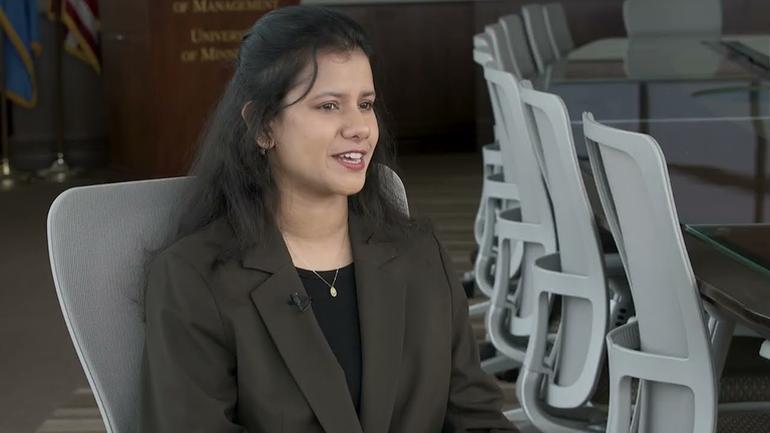
5 Reasons to Pursue a Master of Science in Finance
Thursday, February 2, 2023
Carlson School Graduate Programs
Find Your Master's DegreeResources for Prospective Graduate StudentsLast updated: April 9, 2024
With a rapidly digitizing economy and a fast transforming socio-geopolitical landscape, the financial sector faces many new challenges and opportunities. A master’s degree in finance can set you up to start or advance your career in this dynamic and exciting field. Here are five reasons to pursue this degree:
1. Be in high demand
Finance professionals are consistently in demand because financial decisions impact every aspect of a business. From indicating overall health to measuring performance across departments, sound management of resources critically guides a business’ goals and initiatives. With the rise of new technologies and big data, companies will increasingly value skilled professionals who can analyze and translate financial data into fruitful business decisions and insights.
It’s no surprise then that the U.S. Bureau of Labor Statistics (BLS) projects finance-related jobs to grow over the next decade. For example, financial analyst positions are expected to grow by nine percent, financial managers by 17 percent, and personal financial advisors by 15 percent—much faster than the five percent average growth rate projected for all occupations.
The Carlson School’s Master of Science in Finance (MSF) program can help you become a tech-savvy financial professional who’s in high demand. Through our comprehensive curriculum, you’ll receive advanced quantitative training and develop computation skills now driving the field. With a solid foundation in finance theory and extensive practical application experiences, you’ll be prepared to generate value wherever you go.
2. Boost your earning potential
While salaries depend on a number of factors such as location, experience, and specialization, a finance master’s program can help you start your career with a higher wage. For example, the Carlson School's MSF class of 2023 saw a median base salary of $86,900. Compare this to $69,117, the annual wage for someone with a bachelor’s in business administration.
The Carlson School’s finance graduate program is also a Chartered Financial Analyst (CFA) University Affiliation Program. This means our curriculum covers a significant portion of the CFA Candidate Body of Knowledge, which prepares you for the CFA exam. According to Analyst Prep, getting a CFA designation can boost your salary an additional 15 to 20%.
3. Expand your professional opportunities
A graduate program offers in-depth and comprehensive training in finance, which can help you qualify for a greater range of jobs in the field. Some jobs you’ll be able to pursue with a master’s in finance include investment banker, wealth management advisor, and chief financial officer.
At the Carlson School, you’ll build foundational skills and knowledge through coursework in valuation, financial reporting and analysis, and corporate finance, and work with programming software and databases such as Python and Compustat. Our applied curriculum model also ensures you’ll have opportunities to solve financial challenges for real client companies. For example, students participating in the Carlson Funds Enterprise manage over $50 million of investment money for clients. (We're the 2nd largest student-managed investment fund in the U.S.) Through our program, you’ll enter the job market ready to succeed in a variety of roles whether you’re interested in consulting, corporate finance, risk management, or investment and commercial banking.
4. Grow your network of finance professionals
A master’s program offers many opportunities to develop meaningful relationships, which can help you launch and advance your career. Your built-in network of faculty mentors, peers, and alumni can help you stay current with industry trends and help you navigate each stage of your career.
The Carlson Business Career Center (CBCC) guides you through developing a professional network and offers personalized career coaching so you’ll be ready to enter the job market. If you choose the 16-month track in the MSF program, you’ll receive support from the CBCC for an internship search, so you can gain additional real-world experience and boost your resume before graduation.
5. Stand out with a specialization
Master’s programs are an excellent way to establish or hone an area of expertise so you can emerge from the program ready to excel with your unique knowledge and skills profile. The Carlson School’s MSF program offers specializations for you to explore and pursue based on your interests: asset management, corporate finance, and healthcare finance. Or you can pursue our finance research track, which prepares you for research-oriented jobs and helps you gain admissions into a PhD program in finance. Whichever path you choose, unique opportunities will ensure you acquire the skills and experience needed to stand out from the crowd.
Finance is a dynamic and exciting industry. If you’re curious about learning new things, can take on challenging tasks, and are quantitatively oriented, a master's in finance can help you move forward in the field. Learn more about how the Carlson School’s Master of Science in Finance program can take your career to the next level whether you’re new to the field or seeking to advance.
Preparing your future career
Learn how the Master of Science in Finance degree helped three alumni launch and accelerate their finance career at three different companies.
